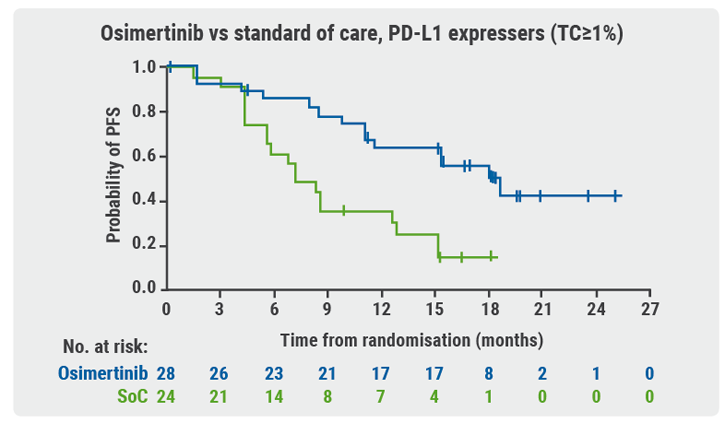Historically, the standard of care for patients with unresectable, stage 3 NSCLC has been platinum-based chemoradiation. However, outcomes have been poor with approximately 15-30% of patients being alive after 5 years [1]. Before the approval of ICIs changed the treatment paradigm, several studies investigated systemic therapy with curative intent after disease control with chemoradiation. However, none demonstrated improved survival [2].
In the world-wide phase 3 PACIFIC trial, patients with stage 3 NSCLC without progression after chemoradiation and with good performance status, received either durvalumab or placebo. Recent analyses showed that both primary endpoints were met, with significant improvements of PFS and OS with durvalumab [3,4]. As a result, durvalumab has been approved in the USA, Europe [5], Japan, and other regions.
However, after discontinuation, many patients received further anticancer treatment (41% and 54% in the durvalumab and placebo groups, respectively), including immunotherapies. This may have influenced the OS outcomes. Using the Rank Preserving Structural Failure Time (RPSFT) model, Dr Phillip Dennis (AstraZeneca, United Kingdom) and co-investigators quantified the specific impact of subsequent immunotherapies on OS [6]. This exploratory analysis was consistent with the ITT analysis and, according to Dr Dennis, adds to the robustness of the conclusion that durvalumab provides significant OS benefit to patients with unresectable, stage 3 NSCLC. So, analysis of treatment-switching is a useful tool to estimate potential OS outcomes in clinical practice scenarios with different patterns of subsequent I-O treatment, changing from country to country and over time [6].
Patient-reported outcomes
Some recent presentations of the phase 3 PACIFIC study showed that durvalumab treatment did not compromise patient symptoms, functioning, or global health status vs placebo in the ITT population. Dr Marina Garassino (Instituto Tumouri di Milano, Italy) et al. retrospectively investigated the impact of tumour PD-L1 expression on patient-reported outcomes (PROs) to better understand the benefit/risk profile of durvalumab across all PD-L1 subgroups [7]. In this post-hoc analysis, there were no clinically meaningful differences in PROs between treatment arms across various PD-L1 subgroups. Results for the PD-L1 subgroups were generally consistent with those in the ITT population, suggesting that global health status and quality of life were maintained regardless of PD-L1 expression, including for patients with PD-L1-negative NSCLC (PD-L1 expression of <1%). According to Dr Garassino, these data further support the PACIFIC regimen, i.e. durvalumab after concurrent chemoradiation, as the standard of care for unresectable, stage 3 NSCLC [7].
- Yoon SM, et al. World J Clin Oncol. 2017;8:1-20.
- Skrzypski M, Jassem J. Cancer Treat Rev. 2018;66:114-121.
- Antonia SJ, et al. N Engl J Med. 2017;377:1919-1929.
- Antonia SJ, et al. N Engl J Med. 2018;379:2342-2350.
- Imfinzi EMA SmPC.
- Ouwens M, et al. ELCC 2019, abstract 83O.
- Garassino M, et al. ELCC 2019, abstract LBA2.
Posted on
Previous Article
« Molecular characteristics of SCLC Next Article
Experiences from Germany »
« Molecular characteristics of SCLC Next Article
Experiences from Germany »
Table of Contents: ELCC 2019
Featured articles
Electromagnetic navigation bronchoscopy
Current Management of Early Stage NSCLC
Trial Data: Early Stage Lung Cancer
Electromagnetic navigation bronchoscopy
Genomic and immune profiling
Immunotherapy in Stage 4 Lung Cancer
Other I-O combinations
Predictive diagnostics for I-O
Trials: Immunotherapy in Stage 4 Lung Cancer
Post-study immunotherapy in MYSTIC
Implementation of Personalised Lung Cancer Care in Clinical Routine
How can societies help to implement personalised treatment?
Optimal Management of Brain Metastases in NSCLC
Incidence and local treatment
Brain irradiation as treatment option
Small Cell Lung Cancer: New Targets
Molecular characteristics of SCLC
Immunotherapy in SCLC: trial data
Related Articles
January 28, 2022
Promising outlook for sugemalimab in non-small-cell lung cancer
September 21, 2021
Real-world data shows inferior survival compared with IMpower150 results

© 2024 Medicom Medical Publishers. All rights reserved. Terms and Conditions | Privacy Policy
HEAD OFFICE
Laarderhoogtweg 25
1101 EB Amsterdam
The Netherlands
T: +31 85 4012 560
E: publishers@medicom-publishers.com

